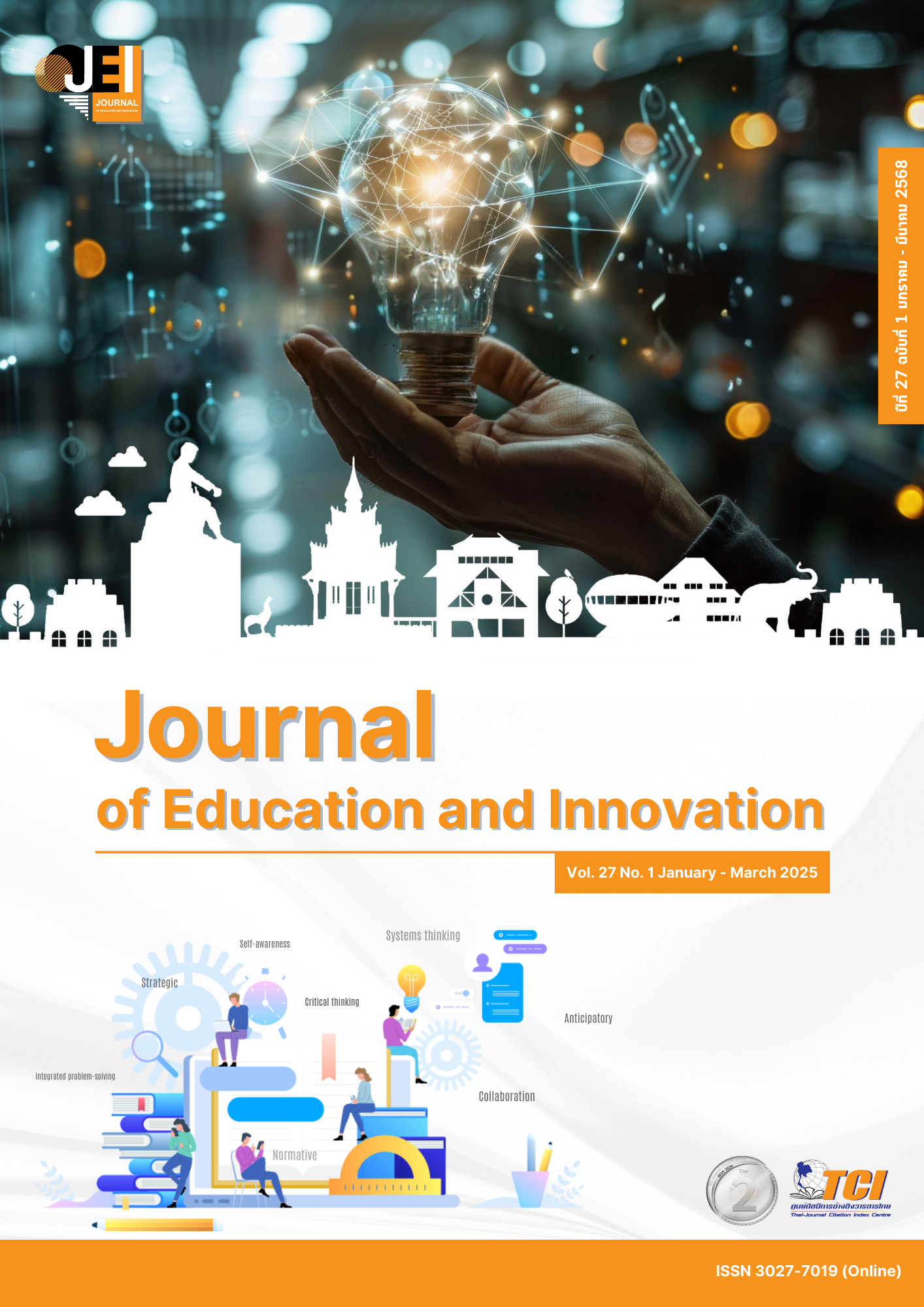การประเมินความต้องการจำเป็นเพื่อการพัฒนาความสามารถด้านการประเมินการเรียนรู้ ของครูวิทยาศาสตร์ สังกัดสำนักงานเขตพื้นที่การศึกษาประถมศึกษากำแพงเพชร เขต 2
Main Article Content
บทคัดย่อ
การศึกษานี้มีวัตถุประสงค์เพื่อ 1) ศึกษาระดับความสามารถด้านการประเมินการเรียนรู้ของครูวิทยาศาสตร์ และ 2) เพื่อประเมินความต้องการจำเป็นเพื่อการพัฒนาความสามารถด้านการประเมินการเรียนรู้ของครูวิทยาศาสตร์ กลุ่มตัวอย่างที่ใช้ในการศึกษาเป็นครูวิทยาศาสตร์ สังกัดสำนักงานเขตพื้นที่การศึกษาประถมศึกษากำแพงเพชร เขต 2 จำนวน 166 คน โดยวิธีการสุ่มตัวอย่างแบบแบ่งชั้น เก็บรวบรวมข้อมูลด้วยแบบประเมินรูปแบบตอบสนองคู่ มาตรประมาณค่า 5 ระดับ ตรวจสอบคุณภาพด้านความตรงเชิงเนื้อหาโดยผู้เชี่ยวชาญจำนวน 3 คน (IOC = 0.67-1.00) และตรวจสอบคุณภาพด้านความเที่ยงด้วยการหาค่าสัมประสิทธิ์แอลฟาของครอนบาค (α = 0.96) สถิติที่ใช้ในการวิเคราะห์ข้อมูลประกอบด้วย ความถี่ ค่าเฉลี่ย ส่วนเบี่ยงเบนมาตรฐาน PNImodified และการวิเคราะห์เมทริกซ์ผลการศึกษา พบว่า ความสามารถด้านการประเมินการเรียนรู้ของครูวิทยาศาสตร์ สังกัดสำนักงานเขตพื้นที่การศึกษาประถมศึกษากำแพงเพชร เขต 2 มีระดับความสามารถด้านการประเมินการเรียนรู้อยู่ในระดับมาก ทั้งความสามารถด้านประเมินผลการเรียนรู้ (M = 3.89, SD = 0.73) ความสามารถด้านการประเมินเพื่อการเรียนรู้ (M = 3.86, SD = 0.76) และความสามารถด้านการประเมินเป็นการเรียนรู้ (M = 3.77, SD = 0.77) เมื่อพิจารณาความต้องการจำเป็นที่ต้องได้รับการพัฒนาสูงสุด คือ การประเมินเป็นการเรียนรู้ (PNImodified = 0.17) รองลงมาคือ การประเมินเพื่อการเรียนรู้ (PNImodified = 0.16) และการประเมินผลการเรียนรู้ (PNImodified = 0.15) ตามลำดับ และเมื่อพิจารณาผลการวิเคราะห์ข้อมูลเป็นรายด้าน พบว่าประเด็นของการประเมินเป็นการเรียนรู้ที่เป็นความจำเป็นสูงสุด คือ การออกแบบการประเมินตามสภาพจริงโดยผู้เรียนมีส่วนร่วมในการออกแบบการประเมิน (PNImodified = 0.27) รองลงมาคือ การใช้ผลการประเมินเป็นการปรับปรุงการเรียนรู้ของผู้เรียน และการใช้ผลการประเมินเป็นการปรับปรุงการสอนของครูระหว่างจัดการเรียนการสอนและหลังสิ้นสุดการสอน โดยนักเรียนเป็นผู้สะท้อนตัวเอง (PNImodified = 0.26) และการใช้ผลการประเมินเพื่อการปรับปรุงการเรียนรู้ของผู้เรียน และการใช้ผลการประเมินเพื่อการปรับปรุงการสอนของครูหลังสิ้นสุดการสอน โดยนักเรียนเป็นผู้สะท้อนตนเอง ร่วมกับการนำเสนอรายงานการจัดทำโครงการออกแบบการประเมินการเรียนรู้หลังสิ้นสุดการสอน (PNImodified = 0.21)
Article Details

อนุญาตภายใต้เงื่อนไข Creative Commons Attribution-NonCommercial-NoDerivatives 4.0 International License.
เจ้าของบทความมิได้คัดลอก หรือละเมิดลิขสิทธิ์ของผู้ใด หากเกิดการละเมิดลิขสิทธิ์ ไม่ว่าวิธีใด หรือการฟ้องร้องไม่ว่ากรณีใด ๆ ที่อาจเกิดขึ้นได้ กองบรรณาธิการวารสารศึกษาศาสตร์ ไม่มีส่วนเกี่ยวข้องทั้งสิ้น ให้เป็นสิทธิ์ของเจ้าของบทความที่จะดำเนินการ
เอกสารอ้างอิง
American Federation of Teachers, National Council on Measurement in Education & National Education Association. (1990). Standards for teacher competence in educational assessment of students. Educational Measurement: Issues and Practice, 9(4), 30-32.
Berry, R. (2008). Assessment for Learning: Hong Kong: Hong Kong University Press.
Black, P., & William, D. (1998). Inside the black box: raising standards through classroom assessment. Phi Delta Kappan, 8(2), 139-148.
Catholic Curriculum Corporation–Central and Western Region. (2016). Growing Successfully in Assessment, Evaluation and Reporting. Religious Education.
Chaiso, P. (2013). Developing innovative teaching and learning management to promote learning assessment competency of student teachers for the learning of learners. Bangkok: Department of Education, Faculty of Education, Kasetsart University.
Chaiso, P. (2015). Advanced Educational Assessment. Teaching Documents 01153521. Field of Research and Educational assessment. Bangkok: Department of Education, Kasetsart University.
Chaiso, P. (2017). Assessment of the learning of learners an important process for the teaching profession, research field, and educational assessment. Bangkok: Department of Education, Kasetsart University.
Chumchan, P. (2015). Teacher development model for learning assessment for basic education Institutions (Doctoral dissertation). Bangkok: Kasetsart University.
Chumkaew, S. (2015). Causal Influence of Teacher Assessment Knowledge: Analysis of Equation Models A multilevel structure in which the assessment performance of executives is an adjustable variable (Doctoral dissertation). Bangkok: Chulalongkorn University.
Chumkaew, S., & Thirawitthayalert, P. (2019). Performance in the measurement and evaluation of modern teachers. Journal of teacher professional development, 2(2), 1-15.
Hair, J. F., Page, M., & Brunsveld, N. (2019). Essentials of business research methods. Routledge.
Institute for the Promotion of Teaching Science and Technology. (2003). Science and Technology Teacher Standards. Bangkok: Teachers Council of Thailand Printing House.
Institute for the Promotion of Teaching Science and Technology. (2017). Indicators and learning content in the core of the learning subject group. Science (Revised Edition B.E. 2560) according to the Core Curriculum of Basic Education B.E. 2551 (2008). Bangkok: Ministry of Education.
Khamanee T. (2015). Assessment while learning. Journal of the Royal Institute, 50(3), 156-173.
Krejcie, R. V., & Morgan, D. W. (1970). Determining sample size for research activities. Educational and psychological measurement, 30(3), 607-610.
Chinasin, K. (2015). The Development of an Assessment Model for Science Learning Emphasizing Feedback to Lower Secondary School Students (Doctoral dissertation). Bangkok: Kasetsart University.
Mayer, J., & Hillman, S. (1996). Assessing student thinking through writing. Mathematic Teacher, 89(5), 428-432.
Maneeon, S. (2016). Assessment for learning. Education Journal, Silpakorn University, 14(1), 15-25.
Ministry of Education. (2017). Basic Education Core Curriculum of the Year 2008 (Revised Edition B.E.2017). Bangkok: Agricultural Cooperative Community Printing House of Thailand.
Office of the National Education Commission. (2000). Minutes of a symposium to consider research reports titled Policy for producing and developing teachers. Bangkok: Office of Teacher Professional Reform.
Office of the National Economic and Social Development Council. (2018). National Strategy on Development and Enhancement Human resource potential 20-year national strategic plan. Bangkok: Office of the National Economic and Social Development Council.
National Institute of Educational Testing Service 12. (2020). Statistics report Fundamentals of teacher competency testing in measuring and evaluating learning outcomes Fiscal Year 2010 (No. 2/2020). Retrieved from http://www.serviceapp.niets.or.th/ETS/Application/Dashboard
Phomphan, P. (2016). Assessment of the use and effectiveness of assessment for learning of mathematics teachers in the Primary school grade 6 under the Chiang Mai Primary Educational Service Area Office District (Master thesis). Nonthaburi: Sukhothai Thammathirat University.
Rayabsri, P. (2017). Design Guidelines of Information Systems Modified according to Teacher Assessment Model for evaluating the learning of secondary school students (Master thesis). Bangkok: Chulalongkorn University.
Rovinelli, R. J., & Hambleton, R. K. (1976). On the use of content specialists in the assessment of criterion referenced test item validity. Tijdschrift Voor Onderwijs Research, 2, 49-60.
Scarino, A. (2013). Language assessment literacy as self-awareness: Understanding the role of interpretation in assessment and in teacher learning. Language Testing, 30(3), 309-326.
Uthongsub, S. (2009). Measurement and evaluation that reflect the quality of learners. curriculum ISSUES 2009. Bangkok: Agricultural Cooperative Association of Thailand Printing House.
Wongwanich, S. (2019). Research to assess the need for necessity. Bangkok: Chulalongkorn University Press.


